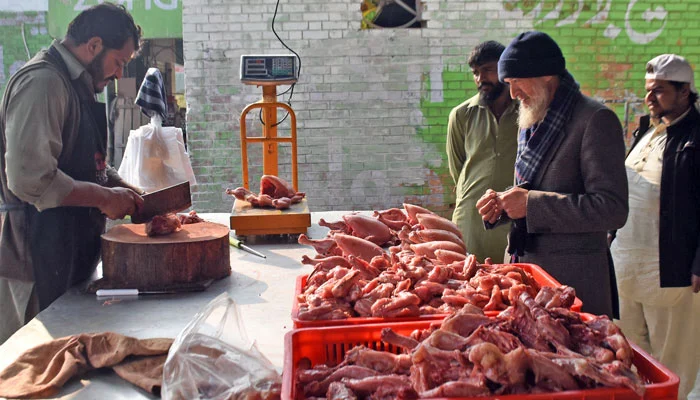Karachi, April 02: The price monitoring teams under the Karachi Commissioner’s Office have imposed fines amounting to approximately Rs45 million on 4,345 retailers by the 27th of Ramazan, marking a significant increase from the Rs31 million fine levied on over 3,500 retailers during the same period last year.
Authorities have taken stringent actions against profiteering, sealing over 161 shops and arresting more than 155 individuals.
In contrast, during the previous year, 58 shops were sealed, but no arrests were made due to a different policy approach.
A notable strategy implemented this year was the auctioning of essential commodities at more than 4,000 designated points across the city—a step that was absent from last year’s enforcement measures.
The number of shop inspections has also risen sharply, with price checks conducted at 30,371 locations compared to 12,304 visits last Ramazan.
Public Reaction and Administrative Response
Despite these enforcement figures, market analysts and consumers argue that the efforts, while seemingly substantial, are inadequate given the vast retail landscape and the extent of consumer exploitation by vendors.
The price monitoring initiative has been carried out by less than 150 senior officers this year, a notable increase from the 64 officials assigned to the task last year.
However, citizens believe that a much larger force is needed to make a real impact.
“If thousands of officers had been deployed to crack down on dishonest retailers, consumers would have seen greater relief,” a shopper at the Water Pump Market in Federal B Area remarked.
Commissioner Karachi’s spokesperson, Sattar Jawed, described the ongoing anti-profiteering campaign as “far more effective” than last year.
He added that the commissioner has been personally reviewing daily price control measures through online meetings with assistant commissioners, deputy commissioners, and Mukhtarkars.
However, a random price survey conducted across the city paints a different picture.
Market Prices vs. Official Rates
Despite regulatory efforts, price violations remain widespread.
Poultry: The price of live chicken ranges between Rs510 and Rs560 per kg, whereas the official rate was fixed at Rs420 per kg as of March 27, 2025. Similarly, chicken meat is being sold for Rs760-820 per kg instead of the government-approved Rs650 per kg. Boneless chicken is priced at Rs1,100-1,200 per kg, while the chest piece is being sold for Rs850-900 per kg.
Flour: Prices of flour varieties set on March 1, 2025, were Rs87 for No. 2.5, Rs92 for fine flour, and Rs100 per kg for chakki flour. However, retailers continue to charge Rs100, Rs110, and Rs120 per kg, respectively.
Tandoori Items: Official rates for bread products—100g chapati at Rs10, 120g tandoori naan at Rs15, and 140-150g naan at Rs18—are widely ignored. Instead, consumers are paying between Rs18 and Rs25 per piece without verifying the weight.
Beef & Veal: Large cow meat with bone is selling for Rs1,200 per kg, and boneless for Rs1,400 per kg, despite official rates being Rs750 and Rs950 per kg, respectively, as fixed on February 27, 2025. Similarly, veal (bachia) is priced at Rs1,400 per kg with bone and Rs1,600 per kg without, well above the controlled rates of Rs1,000 and Rs1,050 per kg.
Milk: The official price for fresh milk is Rs220 per litre. Some vendors, after diluting milk with water, offer a “Ramazan relief” price of Rs200 per litre, while others maintain Rs220 per litre but provide half a litre for free.
Fruits & Vegetables: Prices remain volatile, with several items selling well above their controlled rates:
Bananas: Rs200-350 per dozen (official price: Rs161).
Guava: Rs200-300 per kg (official price: Rs127-130).
Melon (Kharbooza): Rs150-200 per kg (official price: Rs131).
Golden Apple: Rs350-400 per kg (official price: Rs244).
Kullu Apple: Rs250-300 per kg (official price: Rs205).
The same trend is observed in vegetables:
Potato & Onion: Selling at Rs50-80 per kg against the official price of Rs29-40.
Capsicum: Rs200-240 per kg (official price: Rs52).
Spring Onions: Rs150-200 per kg (official price: Rs92).
Spinach: Rs80-100 per kg (official price: Rs35).
Cabbage: Rs120 per kg (official price: Rs29).
Enforcement vs. Reality
While the Karachi administration continues to fine profiteers and enforce price controls, the practical impact on market rates remains questionable.
The disparity between official and actual prices suggests that enforcement measures need to be expanded, with stricter penalties and increased monitoring to curb rampant overpricing.
Consumers remain hopeful that stronger actions will be taken to rein in inflation and ensure fair pricing, particularly during high-demand periods such as Ramazan.









